Technology


9 min

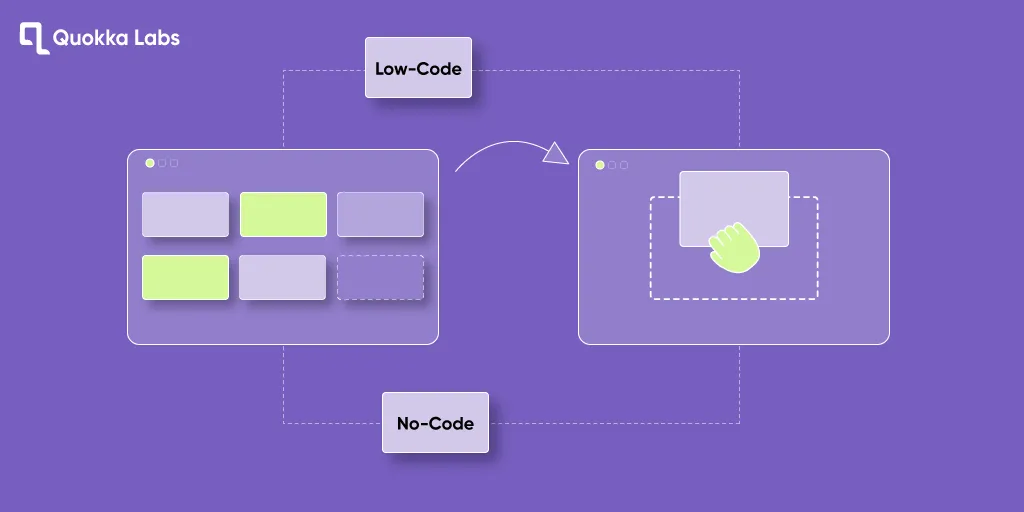
Dive into the game-changing No-Code/Low Code App Development world and unlock innovation's power. Discover how businesses benefit from faster app creation, heightened productivity, and streamlined workflows. Explore the exciting possibilities and navigate the challenges of this revolutionary approach to software development. Take the opportunity to revolutionize your digital presence and take your business to new heights.

By Anupam Singh
06 Jun, 2023
The demand for software applications is ever-increasing in today's fast-paced digital landscape. Traditionally, developing an application required coding expertise and extensive development resources. However, a new paradigm has emerged in recent years – the rise of no code/low code app development. This write-up will discuss the benefits & challenges of low-code/no-code app development and its impact on the software development industry.
First, we will introduce the no-code/low-code application development concept & briefly overview its significance in the current technology landscape.
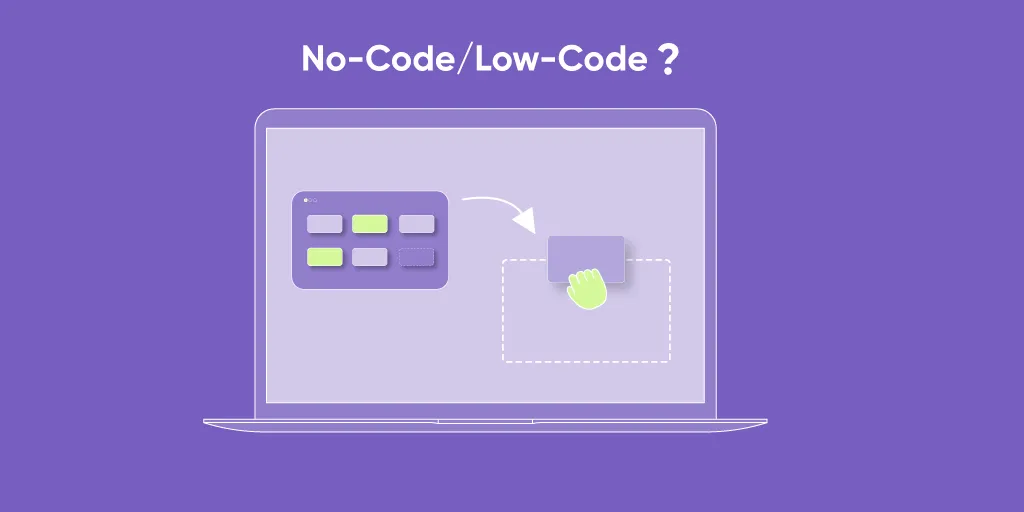 Low-code and No-code application development are two emerging trends in technology that aim to simplify building software applications. They enable individuals with little programming experience to create applications using visual interfaces and pre-built components. It helps in reducing the need for traditional coding.
Low-code and No-code application development are two emerging trends in technology that aim to simplify building software applications. They enable individuals with little programming experience to create applications using visual interfaces and pre-built components. It helps in reducing the need for traditional coding.
Quokka Labs is one of these no-code app development platforms who will provide a visual interface where users can create applications by dragging and dropping pre-built elements. These platforms often include features like workflows, data modeling, and user interface customization. Users can design and deploy applications without writing a single line of code.
On the other hand, low-code development platforms offer more flexibility by allowing users to leverage custom coding when needed. While low-code platforms still emphasize visual development, they provide the ability to extend functionality through coding.
Low-code and no-code (LCNC) platforms provide visual development environments that enable users to create applications without extensive coding knowledge. Here's an overview of how LCNC platforms work:
Low-code, No-code platforms typically offer a visual interface where users can design and develop applications using a drag-and-drop approach. Instead of writing code manually, users manipulate pre-built components and elements visually.
Both platforms provide a library of pre-built components, such as buttons, forms, data grids, and workflows. These components are designed to be easily configurable and customizable through the visual interface. Users can select and drag these components onto the application canvas to create the desired functionality.
Low-code and no-code platforms often include data modeling and integration tools. Users can define data structures, create databases or models, and connect to various data sources. These platforms may offer built-in connectors for popular databases, APIs, and third-party services, simplifying integrating data into applications.
Low code app development allows users to define application logic and workflows visually. Users can create conditional statements, loops, and rules by configuring settings and connecting components through the visual interface. This allows for the creation of complex business logic without writing traditional code.
LCNC platforms typically provide preview functionality, allowing users to see how the application will look and function in real time. It enables users to test and validate their application during development, ensuring that it meets their requirements and functions as intended.
Once the application development is complete, LCNC platforms often provide deployment and hosting options. Depending on the platform's capabilities & target deployment environment, users can deploy the application on various platforms, like cloud mobile or web servers.
Low-code and no-code platforms support iterative development and maintenance. Users can make changes and enhancements to the application by modifying the visual components, logic, or data models. The platforms often include version control & collaboration features, allowing teams to work together on application updates and manage changes effectively.
NCLC platforms simplify the mobile application development process by removing the need for manual coding and providing visual tools & components. These platforms empower users with diverse backgrounds and skill levels to create functional applications efficiently and effectively.
The benefits highlighted below are the growing popularity of low-code/no-code development to accelerate development, collaboration, & drive innovation.
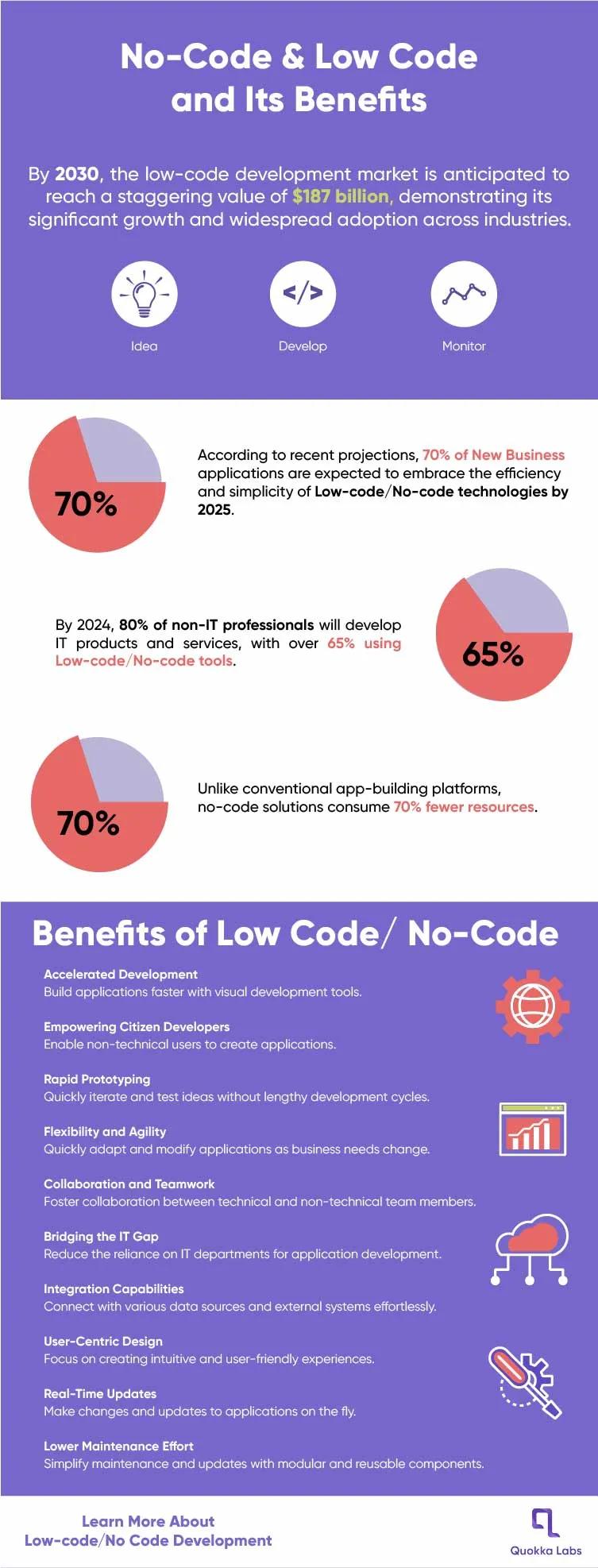
Accelerated Development: Low-code platforms provide a visual interface and pre-built components, allowing developers to create applications faster than traditional coding. The platform's intuitive drag-and-drop interface eliminates the need for manual coding, reducing development time and increasing productivity.
Increased Agility: Low code app development fosters an agile approach to application development. Developers can quickly prototype and iterate on ideas, making real-time changes and enhancements. This flexibility enables faster delivery of applications and allows businesses to adapt to changing requirements, and market demands more effectively.
Enhanced Collaboration: Low-code platforms facilitate collaboration between business stakeholders and IT teams. With visual modeling and rapid prototyping capabilities, business users can actively participate in the development process, providing feedback & making adjustments.
Empowering Citizen Developers: Low-code and no code app development empowers citizen developers, who are non-technical individuals with domain expertise, to build applications without extensive coding knowledge. These individuals, such as business analysts or power users, can leverage low-code platforms to create functional applications, reducing reliance on dedicated development teams and accelerating time-to-market for new solutions.
Cost Efficiency: No code app development significantly reduces development costs. Organizations can allocate resources more efficiently by eliminating the need for extensive custom coding. The rapid development cycle and ease of maintenance also contribute to cost savings throughout the application's lifecycle.
Integration Capabilities: Many low-code platforms offer built-in connectors and integration capabilities, allowing seamless integration with various data sources, APIs, and third-party services. This simplifies integrating new applications with existing systems, reducing the time and effort required for integration.
Scalability and Flexibility: Low-code platforms often provide built-in scalability, allowing applications to handle increasing user demands without major rearchitecting. Additionally, these platforms offer the flexibility to incorporate custom code when necessary. It helps developers to extend functionality beyond the platform's out-of-the-box features.
Mobile and Multi-Channel Support: With the increasing demand for mobile and multi-channel applications, low-code platforms often provide features and templates specifically designed for mobile app development. It enables developers to create responsive and cross-platform applications that work seamlessly across various devices and screen sizes.
Maintenance and Updates: Low-code platforms simplify applications' maintenance and update process. Since the platform manages much of the underlying infrastructure, developers can focus on making enhancements and introducing new features.
Compliance and Security: Many low-code platforms prioritize compliance and security features, such as role-based access control, data encryption, and audit logs. These built-in capabilities help organizations meet regulatory requirements and ensure the security of their applications and data.
While no-code/low-code platforms provide ease of use, they may have limitations regarding customization. We will explore the challenges of limited flexibility and its impact on application functionality.
As applications grow in complexity and user base, scalability and performance become crucial factors. We will discuss the challenges of scaling no-code/low-code apps and strategies to mitigate performance issues.
Although user-friendly, no-code/low-code platforms still require learning and skill acquisition. We will address the learning curve associated with these platforms and how organizations can overcome it.
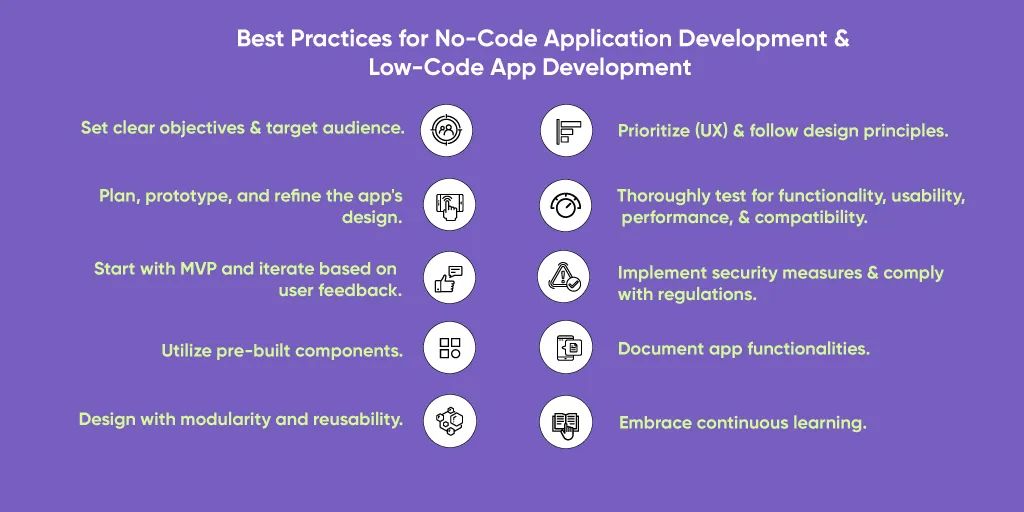
When engaging in no-code/low-code application development, following best practices can help ensure successful outcomes. Here are some essential practices to consider:
Following these practices maximizes benefits, improves efficiency, and delivers high-quality applications. Overall, the impact of visual design on the overall user experience keeps the users engaged.
Learn More:- 10 Best Low-code or No-code Platforms to Build Amazing Products
The future of no-code and low-code application development is promising and is expected to continue evolving in the following ways:
No-code/low-code development platforms are becoming more popular as they democratize app development, allowing non-technical users to create applications without coding knowledge. The ease and speed of development these platforms offer will increase adoption across industries.
No-code/low-code platforms will continue to enhance their capabilities, offering more complex features and integrations. These advancements will enable the creation of sophisticated and powerful applications, reducing the gap between traditional coding and visual development.
Artificial intelligence (AI) and automation will play a significant role in the future of no-code/low-code app development. These technologies will enable platforms to provide intelligent suggestions, automate repetitive tasks, and enhance the overall development experience.
No-code/low-code platforms will emphasize collaboration and integration capabilities, allowing teams to work together seamlessly. Integration with third-party services, APIs, and existing systems will enable developers to leverage various functionalities and data sources.
No-code/low-code platforms will focus on enabling mobile app development, catering to the growing demand for mobile applications. Mobile-specific features, responsive design capabilities, and app store integrations will be enhanced to support the creation of native and cross-platform mobile apps.
No-code/low-code development will expand to offer industry-specific solutions and templates. These solutions will cater to specific verticals such as healthcare, finance, retail, and more, providing tailored functionalities and compliance with industry regulations.
The future of no-code/low-code app development might involve hybrid approaches, combining traditional coding with visual development. This can empower developers to leverage the flexibility and speed of no-code/low-code platforms while incorporating custom code for advanced features or complex integrations.
The developer community around no-code/low-code platforms will grow, fostering knowledge sharing, collaboration, and the exchange of templates, components, and best practices. Marketplaces for pre-built components, themes, and plugins will continue to expand, providing developers with a wide range of resources to enhance their app development process.
Overall, the future of no-code/low-code development looks promising, with increased adoption, technological advancements, and a focus on empowering non-technical users and developers alike. These developments will lead to faster, more efficient app development processes, opening doors to innovation and accelerating digital transformation across industries.
The cost of low-code app development can vary depending on several factors, including the complexity of the application, the features and functionality required, the customization level, and the chosen low-code development platform.
Low-code development platforms typically offer pricing models based on the number of users, applications, and additional features or services. Some platforms may have a subscription-based pricing model, where you pay a monthly or annual fee, while others may offer a pay-per-use or pay-as-you-go model.
The rise of no-code/low-code app development has revolutionized the way applications are created and deployed. The benefits of this approach are significant, offering increased efficiency, faster time-to-market, cost savings, and greater accessibility for non-technical users. You can hire the best mobile app development company like Quokka Labs that has 50+ skilled developers teams to offer clients a great experience.
However, it is essential to acknowledge the challenges of no-code/low-code development. While it reduces the need for coding expertise, more is needed for strategic thinking, planning, and problem-solving skills. Ensuring that the chosen platform aligns with specific requirements and supports scalability can be crucial. Maintaining security, integration capabilities, and customization options can sometimes be challenging.
Despite these challenges, the future of no-code/low-code app development looks promising. As technology advances, these platforms will become more sophisticated, offering advanced features, AI-driven automation, and seamless integrations. With an expanding community and marketplace, developers will have access to a wealth of resources, templates, and best practices to enhance their development process.
The rise of no-code/low-code app development is transforming technology, empowering individuals and businesses to innovate efficiently. Organizations can drive digital transformation and achieve their goals by leveraging the benefits, addressing challenges, and staying updated.
Can anyone use no-code/low-code platforms, or is technical knowledge still required?
No-code/low-code platforms empower anyone to create software solutions without extensive technical knowledge.
What are the long-term cost implications of adopting a low code/no code app development approach?
The long-term cost implications of adopting a Low Code/No Code App Development approach vary based on factors such as:
Organizations must evaluate their needs, project requirements, and long-term goals to assess cost implications. Thorough analysis is crucial to determine the best fit.
Can low code/no code app development platforms be used to develop complex enterprise-level applications?
Low-code and no-code platforms have evolved to offer advanced features, making them suitable for developing complex enterprise-level applications. They provide extensive customization options, integration capabilities, and support for complex workflows. These platforms offer pre-built components, templates, and APIs for building sophisticated applications like CRM systems, supply chain management solutions, and more. Visual interfaces and drag-and-drop functionality facilitate collaboration between technical and non-technical users. However, the suitability may vary based on specific requirements, scalability needs, and desired customization. Sometimes, combining low-code/no-code with traditional coding approaches may be necessary for complex applications.
What is low-code vs. no-code app development?
Low-Code Development: With a visual interface and pre-built components, low-code platforms allow developers to create applications with minimal manual coding quickly. They are suitable for individuals with moderate technical knowledge.
No-Code Development: No-code platforms eliminate the need for coding, offering intuitive interfaces and pre-built templates. Users with limited coding skills can create applications focusing on automation and data management.
Both approaches accelerate development, increase productivity, and lower software creation barriers. No-code platforms are more accessible to users with little to no coding experience.
What Is an API? A Developer's Guide to Application Integration in 2025
By Dhruv Joshi
5 min read
What Is a Push Notification and Why It Matters for Your App Strategy
By Dhruv Joshi
5 min read
Top React Native Development Companies to Build Scalable Apps
By Dhruv Joshi
5 min read
How Wearable Technology Is Driving Real-Time Data Experiences in Mobile Apps
By Sannidhya Sharma
5 min read

Technology


5 min
What is an API? Learn the real meaning of Application Programming Interfaces in 2025, how APIs work, why they're essential to software development, and how to integrate them. This developer-focused guide breaks down API types, use cases, benefits, and best practices for business success.


Technology


5 min
Wearable technology is reshaping mobile apps with real-time insights, enabling smart alerts, fitness coaching, health monitoring, and more. From smart rings to AR glasses, explore how these evolving devices are creating seamless, personalized experiences across various industries and everyday life.


Technology


5 min
Augmented reality in retail helps brands drive sales and reduce returns by transforming how customers discover, try, and buy products. This blog is your guide to using AR strategically, from choosing the right use cases to launching cost-effective AR experiences that delight customers and differentiate your brand.

Feeling lost!! Book a slot and get answers to all your industry-relevant doubts